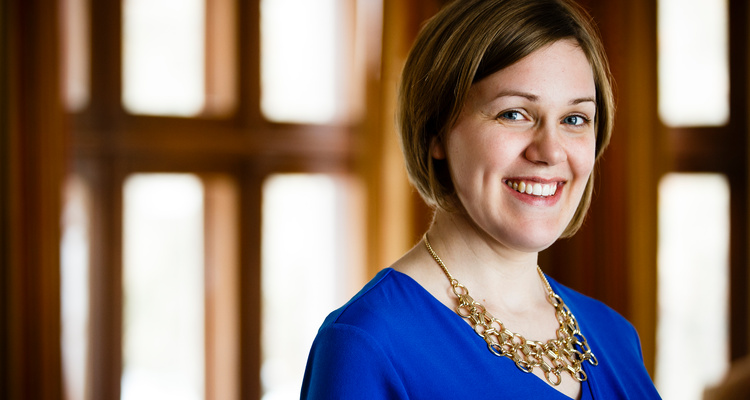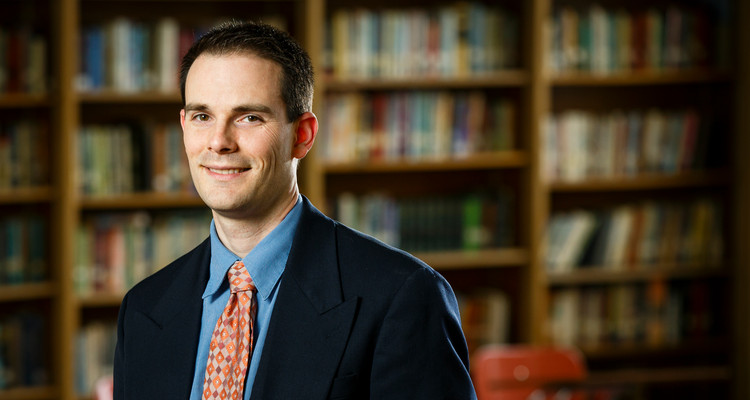Dr. Erika Kidd is the professor of record this spring in “The Pursuit of Happiness,” a first-year course, and “The Catholic Vision,” a third-year course, but students may well hear from a few others – great thinkers such as St. Augustine, Boethius, Flannery O’Connor, Simone Weil, Aristotle and Evelyn Waugh, for example, and for good measure the Scriptures.
Her teaching reflects her education. Kidd has a B.A. from Baylor University, and an M.A and a Ph.D. from Villanova University, but her liberal arts roots go even deeper. She studied the great thinkers of history in a literature-rich curriculum while being home schooled for most of the fifth and sixth grades, and also for a portion of her high school years in Ames, Iowa. Home schooling was at her request in order to give her more time to practice the piano. Both of her parents teach at Iowa State University.
As a high school senior, Kidd enrolled in the one- year program at Augustine College in Ottawa, Canada, along with just 12 classmates, not knowing whether she would receive college credit for the courses she took. She was there on a Sonlight scholarship and for the sheer love of learning. Augustine College provided, she said, “a framework with which to understand Western civilization and the way that the Church has influenced and shaped it.”
Teaching in the Catholic Studies program
“One thing that was very attractive to me about the St. Thomas Catholic Studies program was the way it approaches interdisciplinary study. I use the term ‘productive interdisciplinarity’ because, while Catholic Studies professors and students engage with a wide range of disciplines and scholarly traditions, they do so with a view to focused, fundamental questions: 1) what it is to live well, and 2) what it is to live as a faithful Catholic.”
The Catholic Studies program, Kidd said, can offer students a framework for their studies within which all their other studies find their proper end and proper point.
“The program provides a space for students to reflect on the way their faith informs all areas of life. So we’re not just studying particular doctrines, we’re studying figures who present various ways of life,” she said. “And the program provides an opportunity for students, no matter where they find themselves, to think about what the faith they’ve inherited means for them and to consider how they might understand it more richly.”
Kidd started teaching at St. Thomas in fall 2013. The students she encountered while teaching a class during the interview process were “phenomenal“ and played a big part in her decision to take the position in Catholic Studies.
“I taught a class as a part of my interview process, and I just couldn’t believe how on fire the students were, how many questions and ideas they had, how much they wanted to talk about the readings. I thought, if this is really what the students are like, this is a dream job,” she said. That brings a real energy to the classroom. We are not just memorizing facts: We’re engaged in a conversation about what the good life looks like, what it means to flourish as a human being, and what our faith teaches us about those things.”
A conversion to Catholicism
Kidd’s faith is informed by her religious upbringing as an Evangelical Christian. She is grateful for that formation and for the way that her parents raised her. She and her husband converted to Catholicism about 10 years ago. “I think the story of my conversion really began at Augustine College, where I discovered something of the depth and liveliness of the Catholic faith both before and after the Reformation. The more I studied the tradition, the more compelling I found it to be,” Kidd said.
For her and her husband, David Kidd, a classmate at Augustine, there was an “aha moment” in the conversion process. They were at a grotto, as Protestants, and they watched a Catholic couple walk up and light candles in front of a statue of Mary. They were quietly observing and thinking that it was a little odd, maybe even a little idolatrous; however, Erika and David decided to do the same when the couple walked away.
“We went up and knelt down in the presence of the statue of Our Lady – which didn’t mean a whole lot to us at that point, but was a comforting presence – and we lit candles and prayed,” Kidd recalled. “That was the first moment that I really understood that I could worship and relate to God with my body and not merely with my mind. I sort of knew this already, but I remember that moment as something of a revelation. Finally, I really understood that my faith wasn’t just a matter of studying the right things or thinking the right thoughts – it wasn’t just a matter of those things – but rather the things that I did with my body could profoundly shape how I know God. It just had never occurred to me that the fact of my incarnation made that much difference to how I relate to God. An emphasis on incarnation and embodiment has really shaped my research and teaching ever since.”
She also was influenced by reading Gadamer and Dante, being exposed to the Western tradition through her education, “and coming to see the beauty of the Catholic intellectual tradition and the rich resources available to that tradition.”
The Catholic intellectual tradition
Kidd is carrying on that Catholic intellectual tradition in the Catholic Studies program.
“I am thrilled to be somewhere where I can reflect with students in a deep and sustained way on what it means to live well and what it means to be a faithful Catholic in a variety of ways and settings,” Kidd said.
She adds that she is not teaching just students who will go on to earn Ph.D.s in philosophy, but students who will go on to myriad occupations. “Whatever their vocation or career path, it will be important for Catholic Studies’ students to ask fundamental questions and to have a really robust, rich understanding of the faith.”
“We’re giving our students over to the care of wise men and women who have written and thought well in the past. When I teach, I’m not just teaching my own sense of what a well-rounded human being should know. I’m trying to expose my students to a great conversation within the tradition about what it is to be a flourishing human being,” Kidd said.
“I hope that I can persuade my students that the figures we study are worthy interlocutors; that is, that their books are worth reading and rereading and continuing to revisit even after graduation. It’s not as though there is one Catholic package that I want them to ‘buy,’ accept whole cloth, and then carry with them and reiterate the rest of their lives,” Kidd added.
She wants her students to understand that the Catholic intellectual tradition is not a static thing that gets dropped in their laps but a tradition with many different voices, and she hopes some of those figures – those great thinkers – will become lifelong companions.
Read more from Perspectives magazine.







